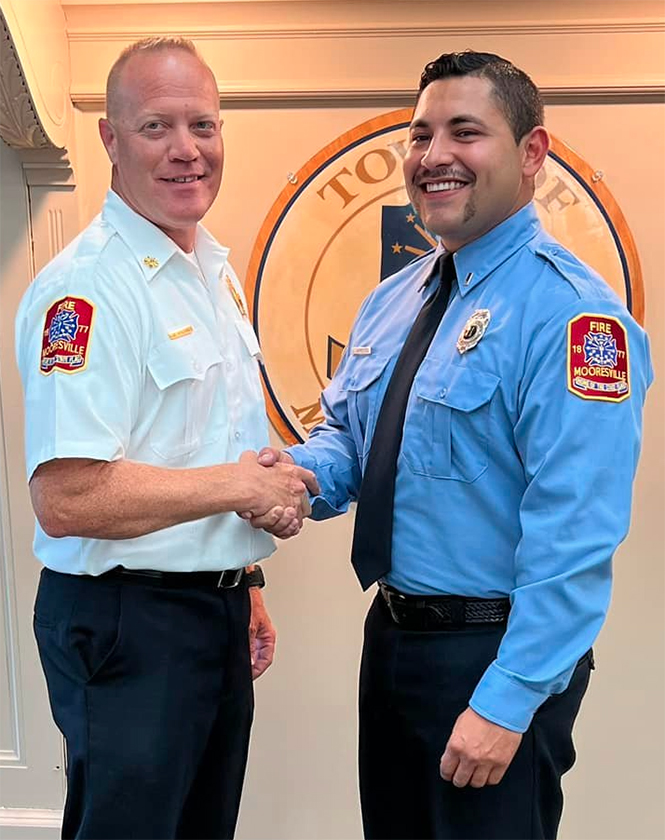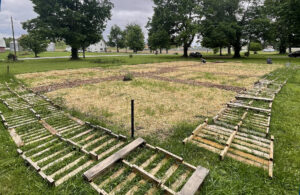
MONROVIA — From a 57-foot-by-50-foot plot of Monrovia soil, a small but growing group of volunteers is building, literally from the ground up, a Morgan County movement encouraging you and your neighbors to grow crops in your own yard and to share nature’s abundance with local people who — in a very real, daily way — encounter what is called food insecurity. Hunger by another name.
It’s the Backyard Farm Collective (BFC), the brainchild of Chris Lamberson. He is a bright 23-year-old Mooresville High School graduate and Air Force veteran who’s studying psychology at the University of Indianapolis.
For Chris and others, it’s about more than food. It’s even about more than easing hunger. It’s also about respecting, advancing and not wasting nature’s gifts. It’s about building a stronger community bond among backyarders, farmers, business people, town promoters, students and schools. It’s about respecting the centuries-old tradition of nurturing a small town’s soul. It’s about backyard gardening being good for your health. It’s about working in dirt, improving the soil, watching plants grow and mature. It’s about how being in nature is also good for the brain, raising your spirits, lowering stress, and reinvigorating your outlook. It’s all that and more.
In that plot of Monrovia land, a community garden experiment is taking place, an effort in which people can use an individual garden spot or pitch in at the larger shared spaces. Property owners Dean and Mary Fran Hadley have loaned to the collective the space for the community garden on Gordon Road.
Already, rows of kale, broccolini, green onions, tomatoes and peppers have pushed through the soil.
Also underway is construction of a fence and an arch, made from donated wooden pallets stood on their sides. The idea is to discourage four-legged intruders from feasting on the produce.
The garden consists of 10 individual spaces and larger spaces to be shared. Spots are still available.
The produce grown will go to food banks, maybe to restaurants and stores, and to the folks who plant and maintain the plots.
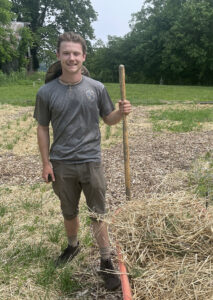
Effort 8 months old
The Backyard Farm Collective, which is about eight months old and is open to all of Morgan County, operates from a headquarters at the Aquatic Design campus, 445 N. Chestnut St., where it has planted a demonstration garden, grows plants in a greenhouse and mixes its compost all amid a menagerie of dogs, ducks and goats.
The collective is gaining support from such folks as local high school agriculture teachers and Future Farmers of America advisers, from the local coffee house, from a farming business (Henderson Farms) that hosts a Friday farmers market, from town officials, and from the town’s festival planners.
BFC is partnering with, among others, Morgan County’s Churches in Mission and Second Helpings, an Indianapolis-based hunger relief agency.
Eight vendors, such as Farm House Brew and Midwest Industry Group, showed up at a Support Local Fest event on May 10 that BFC held at Aquatic Designs. About 200 visitors attended.
Chris is high on the collective’s partners, such as Henderson Farms, and is happy to co-promote its Friday farmers markets at its building, 205 W. Main St.
“We really think … all of Morgan County and into Plainfield can see that Monrovia is a place where there’s good food being locally produced. [Henderson’s] farmers market is proof of that,” he said.
Coffee shop support
Backyard Farm Collective fits right in with ideas that the town’s coffee shop, Farm House Brew, 55 S. Chestnut St., had begun to advance at the turn of the year, said co-owner Carrie Syczylo.
Carrie and her co-owner husband, Michael, “decided that we needed to strengthen our community.”
So, the Syczylos formed a group of volunteers concerned with food security that wanted to start a community garden and also unite the community, Carrie said. When Chris visited with the group, they found their ideas “worked perfectly with what Chris was doing.”
The Syczylos, who have run their Monrovia coffee shop for more than 6 years, put the word out around town that they needed a plot of land for the community garden. That effort led them to the Hadleys, who were “very generous and excited about growing food for our community,” Carrie said.
The collective will benefit the town, she said, by getting “down to the bare bones of humanity, and hopefully people in our community will want to ensure that we all have food security.”
As a hub of the community, Farm House Brew has “a duty to do the best thing for our community [and to help] get people together and grow food,” Carrie said.
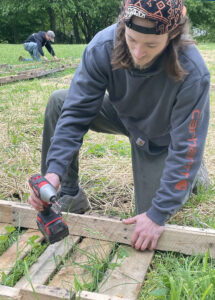
‘We’re shaking things up’
“If we get organized,” Chris says, “we can spread abundance to where we are all taken care of. Also at the same time, people are making friends and getting physical activity and just getting that feeling of community back that I think we might have lost a little bit of over time.”
Nicki L. (who prefers her last name not be used) is director of development and serves on the group’s board, which now consists just of her and Chris. She lives in the Hall neighborhood and grew up planting, weeding and harvesting crops at her parents’ place and hanging out at the family store.
“People around here want to do more in the community, want to volunteer but don’t know how,” Nicki said. “We’re shaking things up trying to show people all the things they can do.”
More boldly, Nicki, a Monrovia High School graduate says, and is not really joking: “We want to save the world. We’re starting here locally. We’ve got to take care of home first [and] as we get people from the outside seeing what we are doing, and getting involved, we want the [food] assistance to help outside.”
She sees it as “getting back in touch with nature. When you think about it when you were a kid, you were out running around and getting dirty. As we grow, we ‘adult’ and we do these things inside and we forget to go outside. It’s important to get outside and breathe in the oxygen and have more green around you.”
Textbook examples
What the Backyard Farm Collective represents is right in line with what Shelby Dye and her colleagues teach in Monrovia High School agriculture classes and emphasize within the MHS Future Farmers of America chapter.
In seven classes, the MHS faculty teach topics “that range from animal systems to plant and soil science to natural resources,” she said in an emailed response. All MHS ag educators are FFA advisers.
Shelby, who has roots in the Monrovia-Eminence area, has taught at MHS for more than 7 years. Some 150 students are enrolled in agriculture classes, and FFA has 50 active members.
MHS ag students are incorporating their classroom-learned knowledge with “hands-on learning at the community garden site,” she said. Eighth-graders, for instance, grow small portable gardens in the classroom and can experience the lessons on a larger scale at the community garden.
Shelby sees growing support for BFC that will “translate into help for the community. This project will empower community members to access healthy food with dignity, even when asking for help feels daunting. Moreover, it creates a wonderful opportunity to collaborate with our local food pantry [Bulldog Blessings] housed within the school, further weaving support and compassion into the fabric of our community.”
Chris is keen on reaching students. BFC is planning school field trips to see a demonstration garden behind Aquatic Designs and a greenhouse that will host hydroponics and aquaponics. Hydroponics raises crops without soil and instead uses what an AI search calls a “nutrient-rich water solution.” Aquaponics combines aquaculture (the raising of aquatic animals such as fish) by feeding “the nutrient-rich aquaculture water … to hydroponically grown plants.” Aquaculture can also produce fish, such as perch and blue gill, as food.
Chris foresees BFC’s involving students from all grade levels — including having high schoolers teaching grade schoolers.
“That way, we are really contributing to the future farmers of America,” he says. “… To be a farmer, you need to be a leader, and we need to help these high schoolers teach agriculture, soil science and biology to those that are younger than them — to see themselves as leaders.”
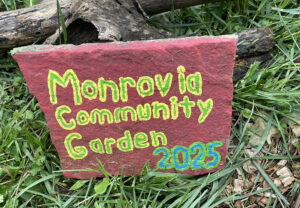
Closing nature’s loop
Much of what the food collective is practicing is what is called a closed loop system, defined as “a natural system where materials are broken down, reused and recycled through various biological processes, rather than being discarded as waste.”
Chris uses raising chickens as an example. The laying hens add to the mix by producing eggs for eating, for birthing chicks or for food for Sunday dinner. The chickens make manure, which can be used to fertilize corn, which can then be fed to other chickens — and the cycle continues, the loop is closed.
And what about any waste that still does occur?
“When you are aware of what you are putting into the trash,” Nicki said, “and how it can be used in another way, that awareness … [can lead you to start] a compost pile for what trash you are producing. You can really be better stewards of the environment.”
Good for the mind
Chris, the psychology student, believes gardening has mental health benefits.
“That’s why I really want to blend psychology and this garden thing together.
“I get so much joy just seeing a plant grow and thrive and having a relationship with my soil and my garden,” he adds. “And that relationship that you have with your garden and nature, I think very well translates to relationships with people.”
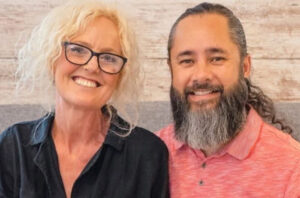
‘Town ready to help’
Eight months in, Chris surveys all of the group’s plans and assesses community support: “Everyone has been really appreciative here in Monrovia of what we are trying to do and has been willing to contribute what they can,” he said. “The town is ready to help, and I think they are excited about things like this.”
“That’s what we want to create: a space where people enjoy doing good for their community and have a good time doing it. … Man, the energy we’ve had here has been awesome.”







